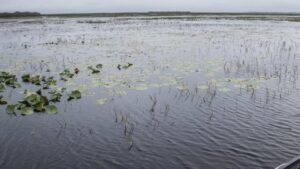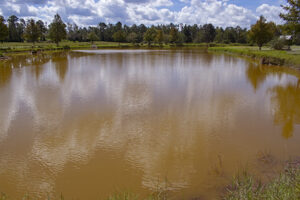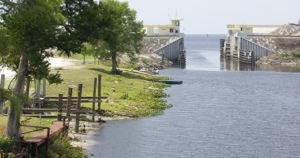With it being hurricane season I’m sure many people are wondering how they affect the bass fishing after they come through an area and how they affect the lakes in the big picture. All of the Kissimmee grass, bulrush, and various other types of grass and reed fields that inhabit the lakes will be cleaned out with the heavy winds. This will allow for those plants to grow greener and fuller than usual which is great for the long run.
But along with cleaning up the grass fields the wind will also stir up silt and gunk off the bottom muddying up the water. This will be at its worse on the wind blown sides (areas where the wind is blowing directly into the bank) of the lakes, and less on the sides where the wind is coming from. With all the rain, the water levels can rise over a foot or more but it will also cool down the water several degrees.
Now lets talk about how this all affects the bass and then go into how to fish it. The bass fishing will slow down significantly for the first few days after the hurricane comes through, with it steadily picking back up each day after. With the grass fields being cleaned out from the wind they will grow greener and thicker and the bass will use them better. What will hurt the fishing the most will be the rising water and muddy water all around the lake.
The fish will have a tougher time locating baits but they will still need to feed. How fish adapt to these changed conditions will depend on the usual water clarity on the lake before the storm. The clearer the water was the tougher time fish will have adjusting because they are simply not used to hunting using there other senses such as sound and there lateral line. But if the water clarity was already murky before the storm the fish will not be affected much because they are already used to those conditions. With the water temperature dropping from the rain the fish will become more active after things calm down and may ever start schooling even in muddy water.
So here’s how to fish it and tackle the challenges laid before you from the storm. The first thing you want to do is find the least muddy water possible that the fish were holding in before the storm, simply because those fish will be able to find your baits easier. With muddy water the fish will move shallow and will be very tight to cover.
Think of it as if you were in a room and the lights are turned off you’re going to feel around for walls and stay close to them so you know where you’re at. This is what the bass will be doing, they are going to move shallow were they can see the bottom and surface and also hold tight to whatever cover they can. The higher water levels will also make bass move shallow and the lower water temperatures will increase bass activity only after the water clarity returns, luckily though the muddy waters will last no more than about a week or two.
Additionally, if the body of water your fishing has creeks or channels running in or out of it with flowing water this is an excellent place to start. Even with muddy water fish will stack up in these areas of running water the most as it draws food to them. At times bass can be so stacked up in these areas after a hurricane that you can catch fish after fish without even moving.
Once you have found an area where you believe there may be bass, work baits that are big and give off a lot of vibration and displace a lot of water and in colors that are easier for bass to see in muddy water. Such as a chartreuse or black/blue Colorado bladed spinner bait, a dark or silver colored rat-l-trap, chartreuse or black/blue chatterbait, or for top water a prop bait. Work these lures SLOW and as close to cover as you can get so the bass have a chance to find and strike it. Another great bait to use is a bulky jig in black/blue, pitch or flip this tight to any cover you can find such as wood, weeds, grass, or bushes. Put a bulky trailer with big water catching appendages to slow the fall and give it a few small subtle twitches after it hits the bottom to give a fish a chance to strike.
As an alternative to artificials, live bait works great in these conditions the fishing will only slow down a little bit for the live bait fisherman because when they are tossed in the water they will actually swim down looking for cover to the spots where the bass are holding and make it easy to catch fish in these conditions. Live bait can also be very useful for finding out exactly where the fish are holding and how active they are, and help you figure out what to use and how to work your aritficials that day. I hope this answers any questions you have about bass fishing in Florida after a hurricane and I hope it helps you catch more fish. If you have any other questions please message below and I will do my best to answer them.
Bass wishes,
Captain AJ Jackson from Freelance Bass Guide Service



